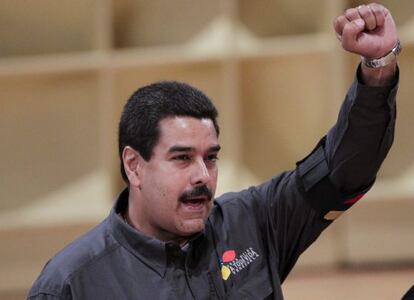Venezuelan race kicks off with charges of homophobic, anti-Semitic attacks
Chávez’s embalmed body will be put on display at the military museum in Caracas

With Venezuelans still mourning the death of Hugo Chávez, the race to elect a new leader kicked off this week with personal attacks and below-the-belt blows from both major candidates, who accuse each other of dirty campaigning.
Just days after Chávez’s funeral, opposition contender Henrique Capriles accused Maduro and the Supreme Court of usurping the Venezuelan Constitution by rushing in to replace the late president as interim leader while at the same time becoming the official candidate. According to the Constitution, the speaker of the National Assembly, Diosdado Cabello, should have become interim president during the 30-day period before the April 14 elections. But the Supreme Court, which is backed by Chávez’s appointees, ruled that Maduro could step in because Chávez was never sworn in for a fourth term on January 10 due to his illness.
In a televised address on Monday, Capriles accused Maduro and government officials of buying time by keeping the seriousness of Chávez’s illness under wraps. The late president hadn’t been seen in more than two months since his fourth cancer surgery in Cuba on December 11. “What are you trying to sell me, Nicolás? You dared to play with the hope of the people. Who knows when Chávez actually died?” Capriles added in reference to stubborn rumors that the leftist president died days or even weeks before March 5.
Both Maduro and Cabello answered back, warning Capriles that he was stoking up violence. “Capriles, you attacked Chávez, and with deep love that the people feel for the commander of their homeland, you have issued a declaration of war,” Cabello wrote on Twitter.
Tensions heightened when Maduro, after officially registering his own candidacy on Monday, appeared to question Capriles’ sexuality during a speech before supporters. “I do have a wife, you hear me? She is here with me. And I do like women.”
You have attacked Chávez..., you have issued a declaration of war"
A furious Capriles accused Maduro of “homophobia” and said that he was not going permit it because “we are trying to build a country where no one is excluded” because of their race, religion or sexual orientation.
It wasn’t the first time that people in the Chávez government have attacked Capriles. During last year’s race — in which the late Chávez beat Capriles in October by 11 percent — the government-backed media described Capriles as “Jewish-Zionist bourgeoisie,” and called on voters to reject “international Zionism” by voting for Chávez. Capriles, a converted Catholic, comes from a prominent Jewish family in Caracas. His grandparents were Holocaust survivors.
Meanwhile the Venezuelan government announced that it will open an official inquiry to see if the United States and Israel were responsible for causing Chávez’s cancer. Bolivian President Evo Morales, a Chávez ally, also said he believed that his fellow leftist’s cancer was intentionally caused. The National Assembly was expected to vote on a measure to allow the late Chávez to be buried next to 19th-century liberator Simón Bolívar in the National Pantheon, but Cabello said on Tuesday that the family requested that the president’s embalmed body be taken to the Revolution History Museum in Caracas, where his supporters can view him.
A procession from the Military Academy, where the body has been lying in state since March 6, will take place next week with some regional leaders expected to attend.
Leaders from more than 50 countries gathered for Chávez’s funeral on Friday. Prince Felipe, who led a small Spanish delegation, was among the heads of government and their representatives selected to be honorary pallbearers.
The government announced that it will extend a seven-day mourning period until Friday.
Tu suscripción se está usando en otro dispositivo
¿Quieres añadir otro usuario a tu suscripción?
Si continúas leyendo en este dispositivo, no se podrá leer en el otro.
FlechaTu suscripción se está usando en otro dispositivo y solo puedes acceder a EL PAÍS desde un dispositivo a la vez.
Si quieres compartir tu cuenta, cambia tu suscripción a la modalidad Premium, así podrás añadir otro usuario. Cada uno accederá con su propia cuenta de email, lo que os permitirá personalizar vuestra experiencia en EL PAÍS.
¿Tienes una suscripción de empresa? Accede aquí para contratar más cuentas.
En el caso de no saber quién está usando tu cuenta, te recomendamos cambiar tu contraseña aquí.
Si decides continuar compartiendo tu cuenta, este mensaje se mostrará en tu dispositivo y en el de la otra persona que está usando tu cuenta de forma indefinida, afectando a tu experiencia de lectura. Puedes consultar aquí los términos y condiciones de la suscripción digital.








































